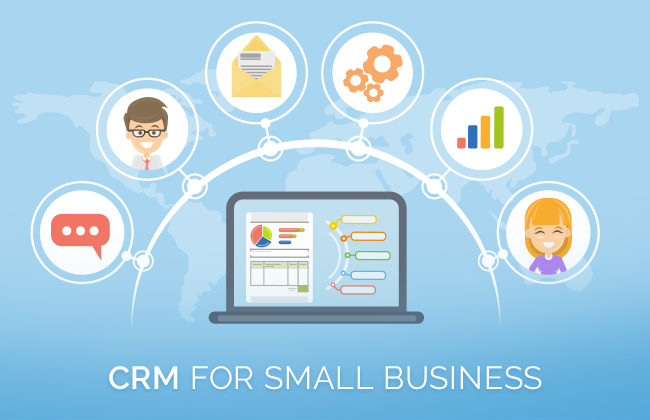
Table of Content
Small businesses often struggle to manage their customer relationships effectively. Customer Relationship Management (CRM) software can help businesses organize customer data, automate tasks, and improve communication with customers. However, with so many CRM options available, small business owners may find it challenging to choose the right one. This article will guide how to choose the best CRM for small business.
The first step in choosing a CRM for small business is to identify the specific needs of the business. Different CRMs offer different features, and it is essential to choose one that aligns with the business’s goals and objectives. For example, if the business relies heavily on email marketing, a CRM with robust email marketing capabilities may be the best choice. Similarly, if the business needs to track leads and sales, a CRM with a strong sales pipeline management feature may be more suitable.
Read Also: How to Choose Software for your Business?
Understanding CRM For Small Business
Definition and Purpose
Customer Relationship Management (CRM) is a software tool that helps businesses manage their interactions with customers and potential customers. The purpose of a CRM is to improve customer satisfaction, increase sales, and streamline business processes. A CRM system can be thought of as a central database that stores all customer information, including contact details, purchase history, and communication history.
Read Also: Tips To Run Small Business
Benefits Of CRM for Small Business
Small businesses can benefit significantly from implementing a CRM system. Here are some of the key benefits:
- Improved Customer Relationships: A CRM system allows businesses to personalize their interactions with customers by providing a complete view of their purchase history and communication history. This helps businesses understand their customers’ needs and preferences, leading to better customer relationships.
- Increased Sales: By providing a complete view of customer interactions, a CRM system can help businesses identify cross-selling and upselling opportunities. It also helps businesses track leads and sales opportunities, ensuring that nothing falls through the cracks.
- Streamlined Business Processes: A CRM system can automate many business processes, such as lead tracking, sales forecasting, and customer service. This saves time and reduces the risk of errors.
- Better Data Management: A CRM system provides a central database for customer information, making it easier to manage and analyze data. This helps businesses make better decisions based on data-driven insights.
Overall, a CRM system can help small businesses improve their customer relationships, increase sales, and streamline business processes.
Evaluating Your Business Needs
When choosing a CRM for small business, it is essential to evaluate your business needs to ensure that the CRM you choose will meet those needs. This section will discuss two important factors to consider when evaluating your business needs: identifying key features and assessing sales and marketing goals.
Identifying Key Features
Before choosing a CRM, it is crucial to identify the key features that your business needs. Some common features of a CRM include contact management, lead management, sales forecasting, and reporting. However, different businesses may have different needs, so it is vital to identify the features that are most important for your business.
To identify the key features that your business needs, you should consider the following questions:
- What are the main goals of your business?
- What are the current pain points in your sales and marketing process?
- What are the most important metrics to track for your business?
- What are the must-have features for your team to be more productive?
By answering these questions, you can identify the key features that your business needs in a CRM.
Assessing Sales and Marketing Goals
Another vital factor to consider when evaluating your business needs is your sales and marketing goals. A CRM can help you achieve these goals by providing insights into your sales and marketing activities, as well as automating specific tasks.
To assess your sales and marketing goals, you should consider the following questions:
- What are your sales and marketing goals for the next year?
- What are the key metrics that you need to track to achieve these goals?
- What are the current pain points in your sales and marketing process?
- How can a CRM help you achieve your sales and marketing goals?
By answering these questions, you can determine how a CRM can help you achieve your sales and marketing goals, and what features you need to look for in a CRM.
Comparing CRM Options
When it comes to choosing a CRM for a small business, it can be overwhelming to compare the different options available. However, conducting market research and analyzing price versus value can help narrow down the choices. Additionally, reading user reviews and testimonials can provide valuable insight into the user experience.
Market Research
Before making a decision, it’s important to conduct market research to understand the different CRM options available. This can involve researching different providers, comparing features, and understanding pricing structures. It’s important to consider the specific needs of the business and ensure that the chosen CRM is able to meet those needs.
Price Versus Value Analysis
While cost is an important factor, it’s equally important to consider the value that a CRM can provide to the business. This involves analyzing the features and benefits of each CRM option and determining which provides the greatest value for the price. It’s important to consider long-term costs, such as implementation and training, in addition to the upfront cost.
User Reviews and Testimonials
Reading user reviews and testimonials can provide valuable insight into the user experience of each CRM option. This can involve researching online reviews, speaking with other small business owners, or even testing out a free trial. It’s important to consider the overall satisfaction of users and any potential issues or complaints.
By conducting market research, analyzing price versus value, and reading user reviews and testimonials, small business owners can make an informed decision when choosing a CRM.
Considering Integration and Scalability
When choosing a CRM for a small business, it is important to consider integration and scalability. A CRM that can integrate with your current systems and scale as your business grows can save you time and money in the long run.
Compatibility with Current Systems
Before selecting a CRM, it is important to consider the compatibility with your current systems. A CRM that can integrate with your existing software and tools can save you time and effort in data entry and management. Make sure to check if the CRM has pre-built integrations with the tools you are currently using, or if it can be easily integrated through APIs or custom development.
Growth Potential and Upgrades
A CRM that can scale with your business as it grows is crucial. Consider the growth potential of your business and whether the CRM can accommodate your needs in terms of users, data, and features. Look for a CRM that offers upgrades and add-ons to meet your changing requirements without having to switch to a new system.
In summary, when choosing a CRM for a small business, it is important to consider integration and scalability. A CRM that can integrate with your current systems and scale with your business can save you time and money in the long run.
Read Also: Smart Ways to Fund Your Small Business
Analyzing Ease of Use
User Interface and Experience
One of the most important factors to consider when choosing a CRM for a small business is the user interface and experience. The CRM should be easy to navigate and intuitive to use. A cluttered and confusing interface can lead to frustration and decreased productivity.
To ensure that the CRM has a user-friendly interface, it is recommended to test the software before purchasing it. This can be done by requesting a demo or a trial version. During the testing phase, pay attention to the layout, design, and ease of navigation. A well-designed interface should allow users to easily find the information they need and perform tasks efficiently.
Employee Training and Support
Another important factor to consider when choosing a CRM is employee training and support. The CRM should be easy to learn and use, and employees should receive adequate training and support to ensure that they can use the software effectively.
Before purchasing a CRM, it is recommended to inquire about the training and support options available. Some CRMs offer online training resources, while others provide in-person training. Additionally, it is important to consider the level of technical support that will be available. Will there be a dedicated support team available to answer questions and provide assistance when needed?
By analyzing the ease of use of a CRM, small businesses can ensure that they choose a software that is user-friendly and efficient. Providing employees with adequate training and support can also help to increase adoption and productivity.
Ensuring Data Security
In today’s digital age, data security is a critical concern for businesses of all sizes. Small businesses, in particular, need to be extra cautious about protecting their data from cyber threats. Choosing the right CRM system can help small businesses ensure the security of their data.
Compliance Standards
When selecting a CRM system, it’s essential to ensure that it complies with all relevant data protection regulations. Small businesses must comply with regulations such as the General Data Protection Regulation (GDPR) and the California Consumer Privacy Act (CCPA) to protect their customers’ data.
A CRM system that complies with these regulations can help small businesses avoid costly fines and legal actions. It’s essential to choose a CRM system that provides features such as data encryption, access controls, and audit trails to ensure compliance with data protection regulations.
Data Protection Measures
Apart from compliance standards, a CRM system must have robust data protection measures to safeguard sensitive business data. Small businesses must ensure that the CRM system they choose provides features such as:
- Role-based access controls to prevent unauthorized access to sensitive data
- Data encryption to protect data in transit and at rest
- Regular data backups to prevent data loss in case of a security breach or system failure
- Two-factor authentication to ensure secure access to the CRM system
Small businesses must also ensure that their CRM system provider has a reliable data security policy and a history of implementing security best practices.
In conclusion, small businesses must choose a CRM system that complies with data protection regulations and provides robust data protection measures to ensure the security of their data. By taking these steps, small businesses can protect their data from cyber threats and build trust with their customers.
Reviewing Vendor Support and Services
When selecting a CRM for a small business, it is essential to consider the level of support and services provided by the vendor. This section will discuss two key areas to review: customer service and after-sale support.
Customer Service
Good customer service is critical for any business, and it is no different when it comes to selecting a CRM. When evaluating vendors, it is vital to consider the level of customer service they offer. Some key factors to consider include:
- Availability: Is customer service available 24/7 or only during certain hours?
- Response time: How quickly does the vendor respond to customer inquiries or support requests?
- Channels: What channels are available for customer service, such as phone, email, or chat?
It is important to choose a vendor that provides reliable and responsive customer service to ensure that any issues or questions can be addressed in a timely manner.
After-Sale Support
After-sale support is another essential factor to consider when choosing a CRM vendor. This includes ongoing support and maintenance after the initial purchase. Some key factors to consider include:
- Updates and upgrades: How often does the vendor release updates or upgrades to the CRM, and how are these updates delivered?
- Training: Does the vendor provide training resources or support to help users get the most out of the CRM?
- Technical support: What level of technical support is provided, and how quickly can issues be resolved?
Choosing a vendor that provides reliable after-sale support can help ensure that the CRM continues to meet the needs of the business over time.
In summary, when selecting a CRM for a small business, it is important to review the level of support and services provided by the vendor. This includes evaluating customer service and after-sale support to ensure that the CRM is reliable and meets the needs of the business.
Making the Decision
After researching and comparing different CRM options, it’s time to make a decision. This section will cover some key considerations to keep in mind when making the final choice.
Trial Periods and Demos
Before committing to a CRM, it’s crucial to take advantage of any trial periods or demos offered by the provider. This allows the small business to test out the software and ensure that it meets their needs. During the trial period or demo, it’s essential to consider the following:
- How easy is it to navigate the software?
- Does it offer all the features necessary for the business?
- How responsive is the customer support team?
By taking the time to thoroughly test out the CRM, the small business can make a more informed decision and avoid any surprises down the line.
Read Also: Tools And Services For Small Business
Implementation and Adoption
Setting Up the CRM
Once a small business has decided on a CRM system, it is vital to ensure that it is set up correctly. This involves inputting all relevant data into the system, such as customer information, sales data, and marketing campaigns. And to ensure that the CRM system is customized to meet the specific needs of the small business. This may involve adding custom fields, setting up workflows, and creating reports.
It is important to involve all relevant stakeholders in the setup process, including sales, marketing, and customer service teams. This ensures that the CRM system is set up to meet the needs of all departments and that everyone is on board with the new system.
Monitoring and Feedback
Once the CRM system is up and running, it is important to monitor its performance and gather feedback from users. This allows small businesses to identify any issues and make improvements to the system. It is important to regularly review reports and analytics to track progress and identify areas for improvement.
Small businesses should also gather feedback from users on a regular basis. This can be done through surveys, focus groups, or one-on-one interviews. Feedback can be used to identify areas where users are struggling or where the system is not meeting their needs. This allows small businesses to make improvements to the system and ensure that it is being used effectively.
Concluding CheckList
To ensure that the chosen CRM is the right fit for the small business, it’s important to create a final checklist. This checklist should include all the necessary features and requirements for the business. Some items to consider including on the checklist are:
- Contact management capabilities
- Lead and opportunity tracking
- Sales forecasting
- Customization options
- Integration with existing software
- Mobile Accessibility
- Pricing and affordability
By creating a final checklist, the small business can have a clear and organized way to evaluate each CRM option and make the best decision for their needs. The implementing and adopting a CRM for small business can be a complex process, but it is essential for small businesses looking to grow and succeed. By ensuring that the system is set up correctly and gathering feedback from users, small businesses can ensure that their CRM system is effective and meets the needs of their organization.




